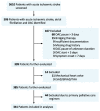Etiology of Ischemic Strokes of Patients with Atrial Fibrillation and Therapy with Anticoagulants
- PMID: 32932971
- PMCID: PMC7564370
- DOI: 10.3390/jcm9092938
Etiology of Ischemic Strokes of Patients with Atrial Fibrillation and Therapy with Anticoagulants
Abstract
Background: Reducing the number of ischemic strokes in patients with atrial fibrillation despite oral anticoagulation remains an important, yet largely unsolved challenge. Therefore, we assessed the etiology of ischemic strokes despite anticoagulation with vitamin K antagonists (VKA) or non-VKA oral anticoagulants (NOACs).
Methods: Patients with known atrial fibrillation (AF), treatment with VKA or NOAC, and acute ischemic stroke admitted between 2015 and 2018 (1st half) were identified from the hospital database. Brain imaging data were independently reviewed. An integrated etiologic classification according to the ASCOD system was made. Medication errors (admission INR <2.0 in the VKA- or NOAC-specific concentration <10 ng/mL) or dosage/dosing errors were also analyzed.
Results: Of 3610 patients screened, n = 341 were included (VKA, n = 127; NOAC, n = 214). An overall increasing rate of OAC-associated stroke per year was observed. In 95.3% of patients with adequate diagnostic work-up (n = 321/337), at least one additional potential, uncertain, or unlikely non-cardiac cause of stroke was identified. More patients in the VKA than in the NOAC group had a medication error (81/127, 63.8% vs. 102/205, 49.8%; p = 0.013).
Conclusions: Stroke risk factors despite atrial fibrillation were highly prevalent. Although less common with NOACs than VKAs, medication errors are still frequent.
Keywords: anticoagulant drugs; antithrombins; cerebral stroke; factor Xa inhibitors; vitamin K antagonist.
Conflict of interest statement
J.C.P. has received consultation fees and travel expenses from Abbott, Akcea, Boehringer Ingelheim, Daiichi Sankyo and Pfizer, outside the submitted work. J.K. received the Olympia-Morata grant from the Medical Faculty of the University of Heidelberg, a research grant, personal fees, and lecture honoraria from Alnylam pharmaceuticals, and advises for Akcea Therapeutics. P.A.R. reports personal fees from Boehringer Ingelheim, Bayer, Pfizer, Daiichi Sankyo, and BMS, outside the submitted work. K.H. reports no competing interests.
Figures



References
-
- Ruff C.T., Giugliano R.P., Braunwald E., Hoffman E.B., Deenadayalu N., Ezekowitz M.D., Camm A.J., Weitz J.I., Lewis B.S., Parkhomenko A., et al. Comparison of the efficacy and safety of new oral anticoagulants with warfarin in patients with atrial fibrillation: A meta-analysis of randomised trials. Lancet. 2014;383:955–962. doi: 10.1016/S0140-6736(13)62343-0. - DOI - PubMed
-
- Diener H.C., Connolly S.J., Ezekowitz M.D., Wallentin L., Reilly P.A., Yang S., Xavier D., Di Pasquale G., Yusuf S., RE-LY Study Group Dabigatran compared with warfarin in patients with atrial fibrillation and previous transient ischaemic attack or stroke: A subgroup analysis of the RE-LY trial. Lancet Neurol. 2010;9:1157–1163. doi: 10.1016/S1474-4422(10)70274-X. - DOI - PubMed
-
- Hankey G.J., Patel M.R., Stevens S.R., Becker R.C., Breithardt G., Carolei A., Diener H.C., Donnan G.A., Halperin J.L., Mahaffey K.W., et al. Rivaroxaban compared with warfarin in patients with atrial fibrillation and previous stroke or transient ischaemic attack: A subgroup analysis of ROCKET AF. Lancet Neurol. 2012;11:315–322. doi: 10.1016/S1474-4422(12)70042-X. - DOI - PubMed
LinkOut - more resources
Full Text Sources

